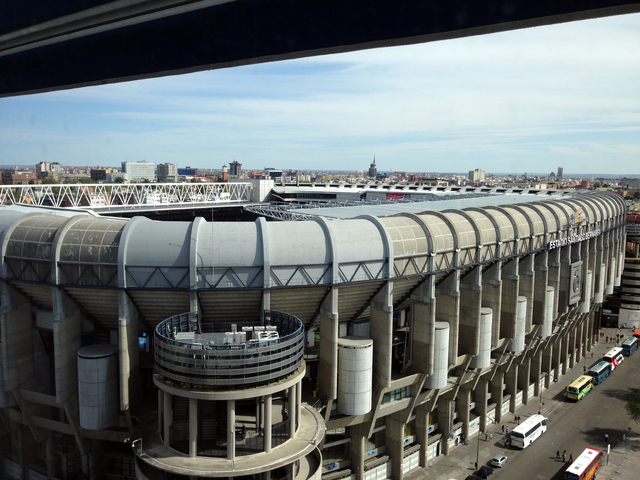Bet Bar booms along with sports wagering in Spain

MADRID — On game days for the Real Madrid soccer team, the area surrounding Estadio Santiago Bernabéu is an outdoor festival. At the stadium, near the city’s financial district, the club’s fans gather with intense passion.
The only place more popular than the 81,000-seat stadium for watching Real Madrid is the Bet Bar.
Located directly across Calle Rafael Salgado from Estadio Santiago Bernabéu’s northern end, the small sports wagering facility is hidden by trees and other landscaping. Inside, five electronic betting terminals offer customers odds on Real Madrid beyond the game’s point spread.
Flat-screen televisions show the contest live. When Real Madrid is playing, other sporting events are forgotten.
“We’re the best location in the city,” said Maria Romero de Alba, who manages Bet Bar. The site is operated by Codere Apuestas, a division of the Codere Group, Spain’s only publicly traded gaming company.
The action at Bet Bar is more than just Real Madrid. The facility offers a wide menu of games, including European soccer, horse racing, auto racing, tennis — Spaniard Rafael Nadal, once the world’s top-ranked tennis player, is still a favored athlete on the circuit — and U.S.-based events, such as Major League Baseball and the NBA and NHL playoffs.
Sports wagering in Spain is a booming business.
Since the mid-2000s, when Spanish laws were enacted to regulate sports gambling, the activity found a growing legion of followers. Dedicated wagering parlors, such as Bet Bar, popped up throughout the country.
Codere has nearly 200 betting locations in Spain. Bet Bar has expanded rapidly. More than a dozen are located in Madrid.
“This one is the best,” Romero de Alba said of the location she manages across from the stadium.
Competition is growing. Gibraltar-based Ladbrokes and a Spanish corporation formed Sportium, which are small betting salons with slot machines and sports wagering terminals. There are more than 170 outlets throughout Spain.
Mobile wagering is also catching fire. It’s commonplace for Real Madrid fans — even those sitting inside the stadium — to place in-game wagers on penalty kicks and other plays through mobile phones.
With the potential legalization of sports wagering a hot-button issue in the United States, sports leagues and the gaming industry might look at Spain and other European countries as a model for expansion.
Several sports league commissioners — led by the NBA’s Adam Silver — softened their once-rigid opposition to sports betting. The Washington-based American Gaming Association commissioned an internal study on sports betting and the growth of daily fantasy sports websites. AGA President Geoff Freeman said the results would be released later this year.
Spain and other European countries are well ahead of the U.S. in the legal sports betting arena.
Bet Bar, Sportium and other legal gambling locations are commonplace — think Starbucks, or, since we’re talking gambling, Dotty’s.
But the locations are also hidden. You don’t see flashing neon and in-your-face advertisements. The places easily could be mistaken for taverns.
Bet Bar, for example, looks like a lounge with a full bar service and tapas kitchen. Comfortable chairs and sofas surround the television screens, which show sporting events as well as news programs. The only signs of gambling are the five betting terminals and four slot machines dispersed around the facility.
Like all businesses in Spain, smoking is only permitted outside.
Gamblers sign up with Bet Bar through Codere and create an account with a player’s card and password. The numbers are keyed into a betting terminal before the wagers can be placed. Payouts are made at the facility’s counter. Codere also requires online customers to register their accounts in a land-based location.
Codere has a presence in eight countries and operates five areas of legal wagering, including sports betting. The company manages more than 52,000 slot machines and owns two racetracks. Codere’s online betting presence is expanding.
Spain enacted online gaming regulations in 2011. The licensed operators, such as Codere, forced the country to take a stronger stance against illegal online gaming businesses and off-shore operators not licensed in Spain.
For example, the primary sponsor for Real Madrid between 2007 and 2013 was Internet gaming giant Bwin.party Gaming. The company’s name held the primary space on the front of Real Madrid’s jersey — one of the top selling pieces of sports merchandise in Spain.
But Gibraltar-based Bwin is not licensed in Spain. A Spanish court ruled in 2013 that any kind of online gaming without a Spanish license was illegal, and Real Madrid was forced to change sponsors. Dubai-based airline Emirates reportedly is paying 30 million euros a year ($40 million) to place the slogan “Fly Emirates” across Real Madrid’s jersey.
Bwin is still the official “digital partner” of Real Madrid.
Legal online gaming in Spain attracts millions of registered customers, according to the country’s regulatory body. The market has a 25 percent tax rate for gaming revenue, which discouraged some operators. According to regulatory statistics, half of the online gamblers wager on sports while 40 percent of the customers play Internet poker.
Online gaming growth hasn’t slowed the Bet Bar expansion. More locations are planned for Madrid.
“It’s an exciting business, and we’ll continue to grow,” Romero de Alba said.
Howard Stutz’s Inside Gaming column appears Wednesdays and Sundays. He can be reached at hstutz@reviewjournal.com or 702-477-3871. Find him on Twitter: @howardstutz.